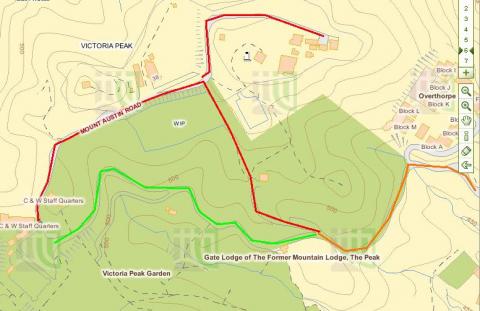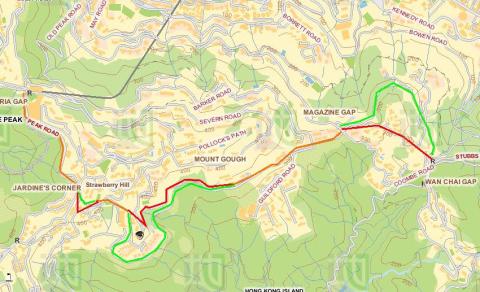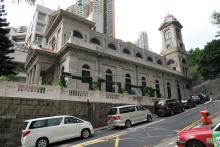1909 Map of Hong Kong (overlay version)
Primary tabs
May 2016 update: This 1909 paper map is now available as an overlay on the main map. Please see:
http://gwulo.com/map-of-places#14/22.2704/114.1489/Map_by_ESRI-1909_HK-M...
To play with it, first click the 'arrows' icon in the top-right corner to see a bigger map. You can drag it around, zoom in and out, and click any red marker to see notes and photos about that Place. (Click here for a more detailed instructions.)
Things to see
The coastline
The map around Central is accurate, showing the coastline following Connaught Road.
Around the Naval dockyard, things aren't quite so clear. The dockyard extension had only been finished a few years before, and the map makers hadn't caught up yet. Although they've drawn the map to show the extension, it's only a rough layout, and the pre-extension coastline is still clear to see.
Over in Wanchai the coast still follows Johnston Road. It will have to wait until the 1920s for reclamation to move the coast out to Gloucester Road.
Dodgy mapping
The strip along the north shore had been mapped for many years, and it shows. That section of the map was easy to overlay on today's map, as it's an accurate fit.
But... as we move south, the map and reality get further and further apart. It starts with Kennedy Road and Macdonnell Road - if you turn the old map layer off and on you'll see what I mean.
Up at the Peak I've tried to force the old map to line up with the new map. Can you see the square in the bottom-left corner of the overlay is all wonky? That shows how much I had to contort the overlay to get anything like a match.
And by the time we get to Hatton Road, there's no match at all. Whoever drew that part of the map just drew a wiggly line and hoped no-one would notice!
So, for mid-levels and further south the old map gives useful road numbers and place names, but don't rely on it for positioning.
Changed road layouts at the Peak
Despite the dodgy mapping, we can still see a couple of the changes that have happened in the last 100 years.
First look up at the very top of the Peak. In 1909 the public road runs up til it hits a fork, then branches east to the flagstaff, and west past the Eyrie. The dotted roads below it run through the grounds of Mountain Lodge. Today the public road runs along one of those dotted roads, explaining why we pass the old Gate Lodge on the way.
Here are the old (red), new (green) and same (orange) roads on today's map:
The other route that caught my eye is from the Peak Tram Station to Wanchai Gap. Today you'd follow Peak Road to Magazine Gap, then on around the hillside to Wanchai Gap.
In 1909, three sections of today's Peak Road didn't exist yet. You'd start out the same, but around Jardine's corner you'd have to go out around where the fire-station is today. Now you cut off that corner.
At Stewart Terrace you'd switch onto Craigmin Road, joining today's road again around Ondina Heights. Finally at Magazine Gap you'd change route again. Instead of skirting round the hill, you'd follow Magazine Gap Road over the hill and down the other side to Wanchai Gap.
What else can you see?
Regards, David
PS If you enjoyed this, there are a couple more of these overlaid maps to choose from. You can see them listed on the left of the screen.
References:
- You can view the original copy of this map at the UK National Archive in Kew, their reference is CO 700-Hong Kong and CHina48. It was originally published in 1909, and includes the text "Copyright by K.A. Massey", and "Litho. by South China Morning Post, Ltd, Hongkong".




Comments
It appears that the broken
It appears that the broken fatter line shows the scenic paths for the Peak (before Lugard Road was built). Is there a legend anywhere on the map that shows this ? I can't find it.
Different projections, not dodgy mapmaking
I suspect the reason why the maps don't line up is that they use very different systems of projection (rather than dodgy map making). Software such as QGIS (free) and ArcGIS (professional and very expensive) can "rubber sheet" maps with different projections to align.
But thanks for doing this. Wonderful. How did you do it?
Dodgy
Hi,
You're right that different projections can cause a certain amount of difference, but they aren't enough to account for the problems described above.
I used QGIS to align the scanned map shown above with the modern maps.
Regards, David